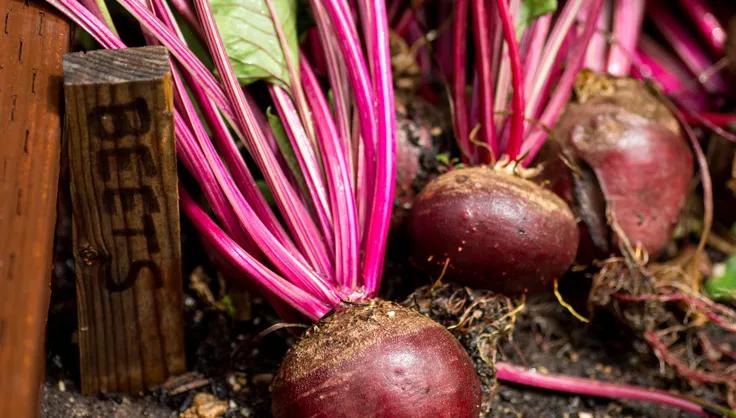To store fresh, firm beets for winter, first trim the greens and then store the roots in a cool, dark place. Use damp sand or sawdust for optimal preservation.
Beets are a nutritious and versatile root vegetable that can be enjoyed year-round with proper storage methods. During winter, preserving their freshness and firmness ensures you can add them to soups, salads, and other dishes without compromising on quality. Proper storage not only extends their shelf life but also retains their flavor and nutritional benefits.
By following a few simple steps, you can keep your beets fresh and ready for use throughout the cold months. This guide will help you understand the best practices for storing beets effectively.

Credit: it.pinterest.com
Choosing The Right Beets
Selecting the right beets is crucial for winter storage. Fresh, firm beets last longer and maintain their flavor. This section will guide you on choosing the perfect beets for storage.
Varieties For Storage
Not all beet varieties are suitable for long-term storage. Here are some ideal varieties for winter storage:
| Variety | Description |
|---|---|
| Detroit Dark Red | Deep red color and sweet flavor. |
| Chioggia | Known for its red and white rings. |
| Golden Beets | Bright yellow color, mild taste. |
Signs Of Freshness
Identifying fresh beets ensures they last through the winter. Look for these signs of freshness:
- Firm Texture: Fresh beets are firm to the touch.
- Even Color: The skin should have an even, vibrant color.
- Healthy Leaves: Green leaves indicate recent harvest.
Avoid beets with soft spots or blemishes. These signs indicate spoilage and shorten storage life.
Harvesting Techniques
Harvesting beets correctly ensures they stay fresh and firm for winter. Follow these techniques for the best results.
Optimal Harvest Time
Beets are ready to harvest about 50-70 days after planting. Check if the beets are 1.5-3 inches in diameter. Smaller beets are tender and sweet. Larger beets can be woody.
Harvest before a hard frost. Frost can damage the beets. Early morning is the best time to harvest. The soil is cool and moist.
Proper Harvesting Tools
Using the right tools makes harvesting easier and safer. Here are some recommended tools:
- Garden Fork: Loosens the soil around the beets.
- Hand Trowel: Helps dig out the beets gently.
- Pruning Shears: Trims the beet tops cleanly.
- Gloves: Protects your hands from dirt and cuts.
Here is a table summarizing the tools and their uses:
| Tool | Use |
|---|---|
| Garden Fork | Loosens soil |
| Hand Trowel | Gently digs out beets |
| Pruning Shears | Trims beet tops |
| Gloves | Protects hands |
Choose tools that are comfortable and easy to use. Clean your tools after each use. This helps them last longer and stay effective.
Cleaning And Preparing Beets
To store fresh, firm beets for winter, start with proper cleaning and preparation. This step ensures your beets remain fresh and tasty for months.
Washing Methods
First, rinse the beets under cold water. This removes dirt and debris. Use a soft brush to scrub the beet skin gently. Avoid scrubbing too hard to keep the skin intact.
For extra dirty beets, soak them in a bowl of water. This loosens the dirt, making it easier to wash off. Change the water if it gets too dirty. After soaking, rinse the beets under running water again.
Trimming And Cutting
Next, trim the beet tops and roots. Leave about 1 inch of stem attached to prevent bleeding. The root tip can be cut off entirely.
Use a sharp knife to make clean cuts. This prevents damage to the beet. If you plan to store beets whole, cutting is not necessary.
If you prefer to store beets in smaller pieces, cut them into uniform sizes. This makes it easier to use them later. You can slice, dice, or even grate the beets.
| Step | Action |
|---|---|
| 1 | Rinse under cold water |
| 2 | Scrub with a soft brush |
| 3 | Soak in a bowl if needed |
| 4 | Trim tops and roots |
| 5 | Cut into uniform pieces |
Storage Conditions
Storing fresh, firm beets for winter requires specific conditions. Proper storage ensures they stay fresh and delicious.
Temperature Requirements
Beets need to be stored at a cool temperature. The ideal temperature is around 32°F to 40°F (0°C to 4°C). A refrigerator’s crisper drawer works well. Avoid storing beets near fruits like apples. Fruits release ethylene gas, which can spoil beets.
Humidity Control
Humidity is crucial for storing beets. Beets need a high humidity level to stay fresh. Aim for a humidity level of 90% to 95%. Use a damp towel to wrap the beets. You can also store them in a plastic bag with holes. This helps to maintain the right humidity.
| Storage Condition | Requirement |
|---|---|
| Temperature | 32°F to 40°F (0°C to 4°C) |
| Humidity | 90% to 95% |
Follow these conditions to keep your beets fresh all winter.
Storage Methods
Storing beets for winter can be easy. Use the right methods to keep them fresh and firm. Below, we explore two effective storage methods: Root Cellar Storage and Refrigeration Tips.
Root Cellar Storage
A root cellar is a great place to store beets. The cool and dark environment keeps them fresh. Follow these steps for the best results:
- Harvest the beets before the first frost.
- Remove the leaves, leaving about an inch of the stem.
- Brush off any dirt, but don’t wash them.
- Place the beets in a box or basket.
- Cover them with sand or sawdust to retain moisture.
- Store the box in the root cellar.
| Factor | Ideal Condition |
|---|---|
| Temperature | 32-40°F (0-4°C) |
| Humidity | 85-90% |
Refrigeration Tips
Refrigeration is another simple method to store beets. Follow these tips for the best outcomes:
- Trim the leaves, leaving about an inch of the stem.
- Do not wash the beets before storing.
- Place the beets in a plastic bag.
- Make sure the bag has small holes for air.
- Store the bag in the refrigerator’s crisper drawer.
These methods help keep your beets fresh all winter. Enjoy fresh, firm beets whenever you want!
Preventing Common Issues
Storing fresh, firm beets for winter can be tricky. You need to prevent common issues like mold and pests. Follow these steps to keep your beets fresh and tasty.
Mold Prevention
Mold can ruin your beets fast. Keep them dry and clean. Here are some tips:
- Wash beets with cold water. Let them air dry completely.
- Store beets in a cool, dry place.
- Use breathable bags or containers.
- Avoid stacking beets too tightly.
Check your beets regularly for signs of mold. Remove any that look bad.
Pest Control
Pests like beetles can damage your stored beets. Keep them out with these steps:
- Inspect beets before storing. Look for holes or bite marks.
- Use pest-proof containers. Seal them tightly.
- Store beets away from other produce. Pests can spread.
- Clean storage areas regularly.
If you find pests, remove affected beets right away. Keep checking your storage area.
Checking Stored Beets
Proper storage can keep beets fresh and firm throughout winter. Regular checks are essential to ensure they remain in good condition. Let’s explore how to check stored beets effectively.
Regular Inspection
Perform regular inspections to maintain beet quality. Check them every two weeks. This helps catch spoilage early and prevents it from spreading.
During inspections, examine beets for firmness. Firm beets are healthy. Soft ones might have started spoiling.
Identifying Spoilage
Knowing how to identify spoilage is crucial. Look for these signs:
- Soft Spots: Press gently to check for mushy areas.
- Mold: Look for white, green, or black mold.
- Odor: Spoiled beets have a sour smell.
Discard any beets showing these signs. This prevents spoilage from spreading to healthy beets.
Keep an eye on the storage environment. Ensure it remains cool and dry. High humidity can lead to mold growth.
Here’s a quick reference table for spoilage signs:
| Sign | Description |
|---|---|
| Soft Spots | Beets feel mushy when pressed. |
| Mold | Visible white, green, or black spots. |
| Odor | Sour smell indicates spoilage. |
Keep these tips in mind to ensure your beets stay fresh and firm all winter long.

Credit: www.gardeners.com
Using Stored Beets
Once you’ve stored your beets for winter, it’s time to enjoy them. Using fresh, firm beets in your meals can be both delicious and nutritious. Let’s explore some exciting ways to make the most of your stored beets.
Recipe Ideas
Beets are versatile and can be used in various dishes. Here are some simple and tasty recipe ideas:
- Roasted Beets: Slice beets, drizzle with olive oil, and roast until tender.
- Beet Salad: Mix sliced beets with goat cheese, walnuts, and greens.
- Beet Soup: Blend cooked beets with broth, garlic, and cream for a warm soup.
- Pickled Beets: Slice beets and soak in vinegar, sugar, and spices.
- Beet Smoothie: Blend beets with fruits for a healthy drink.
Nutritional Benefits
Beets are packed with nutrients that benefit your health. Here are some key nutritional benefits:
| Nutrient | Benefits |
|---|---|
| Fiber | Supports digestive health and keeps you full longer. |
| Vitamins | Rich in vitamins like A, C, and K for overall health. |
| Minerals | Contains iron, magnesium, and potassium for strong bones and muscles. |
| Antioxidants | Fights free radicals and reduces inflammation. |
Including beets in your diet can improve your energy and well-being. Enjoy these vibrant and healthy veggies all winter long!

Credit: www.cravethegood.com
Frequently Asked Questions
How Do You Store Fresh Beets For Winter?
Store fresh beets by cutting off the greens, leaving an inch of stem. Place them in a perforated plastic bag and refrigerate.
Can Beets Be Frozen For Long-term Storage?
Yes, beets can be frozen. First, cook and peel them. Then, slice or cube and freeze in airtight containers or bags.
What Is The Best Way To Keep Beets Firm?
To keep beets firm, store them in a cool, humid environment. A root cellar or refrigerator crisper works best.
Should Beets Be Washed Before Storing?
No, do not wash beets before storing. Washing can introduce moisture, leading to mold. Brush off any dirt instead.
Conclusion
Storing fresh, firm beets for winter ensures you enjoy their nutrients all season. Use proper techniques to maintain freshness. Keep beets in a cool, dark place and check them regularly. Following these steps, you can savor delicious beets even in the cold months.
Happy storing!
